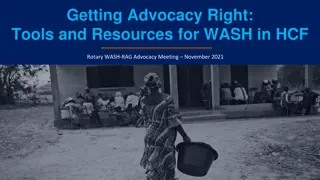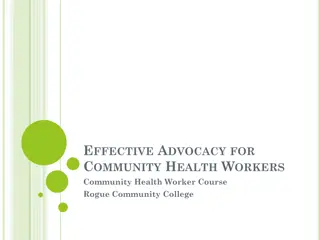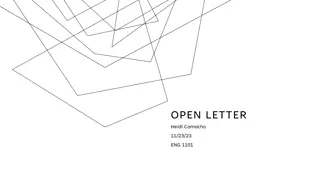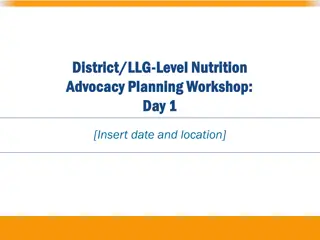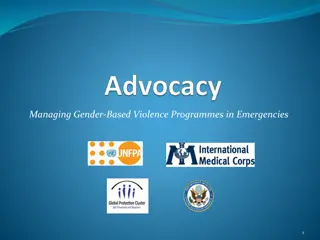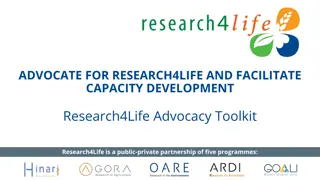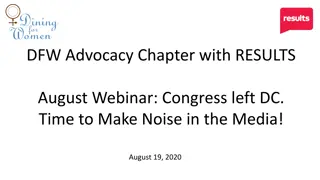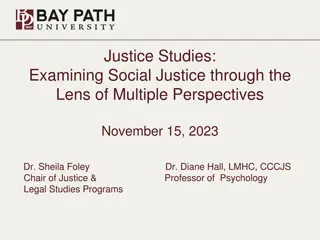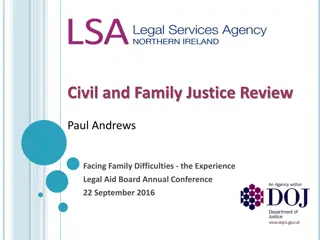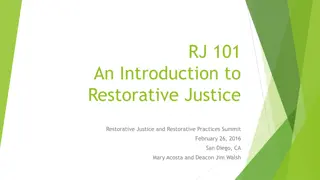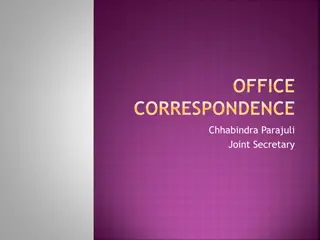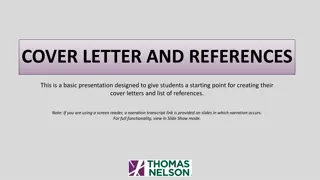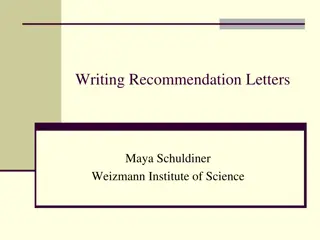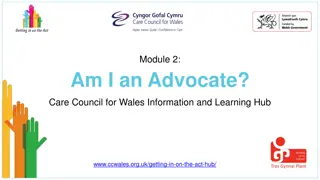Explore Justice and Advocacy Through Letters
Dive into the world of justice and advocacy by understanding the power of letters as tools for change. Discover how activists use written communication to influence decisions, reflect on personal experiences of injustice, and explore the intersection of faith and justice. Uncover the significance of writing letters to oneself as a means of self-reflection and empowerment in the pursuit of a more just world.
Uploaded on Oct 03, 2024 | 0 Views
Download Presentation

Please find below an Image/Link to download the presentation.
The content on the website is provided AS IS for your information and personal use only. It may not be sold, licensed, or shared on other websites without obtaining consent from the author. Download presentation by click this link. If you encounter any issues during the download, it is possible that the publisher has removed the file from their server.
E N D
Presentation Transcript
First Mark of Mission To proclaim the Good News of the Kingdom 2
End Poverty and Hunger Universal Education Gender Equality Child Health Maternal Health Combat HIV/AIDS Environmental Sustainability Global Partnerships 3
Check out Amnesty Internationals Write for Rights campaign to learn more about how letters are used as tools of action Write for Rights Website 4
Letter to Yourself As you can see, letters are an important source of communication. Historically, letters have played a significant part in justice and advocacy work. Activists all over the world use letters as a tool of communication with their government officials to encourage them to make decisions and laws that protect and uphold justice. For this activity, you will be communicating with yourself. It is important in any justice work to situate yourself and be in touch with your own understanding of what you are learning and the work you are doing. Write a letter to yourself reflecting on this. These are a few questions that might guide you: What does justice mean to you? Think of a situation of injustice/justice you have experienced. What did you do? How did you feel? What would you do differently now? What do you hope to get out of connecting faith and justice? 5
PWRDF Letters for Advocacy From time to time PWRDF writes letters advocating on behalf of our partners. Visit our website to see an example of a situation that calls for advocacy. Illegally Searching Offices Article Damage to the offices of Centro de Derechos Humanos Paso del Norte. Photo: Centro de Derechos Humanos Paso del Norte 6
We are all familiar with the map of the world in textbooks and atlases, and on posters. It s one of those images that everyone knows and recognizes. Have you ever considered that it is not entirely accurate? For example, in Peter s World Map Greenland and Africa appear to be approximately the same size while in reality, Africa is 18.7 million square kilometres and Greenland is only 1.3 million square kilometres. Why do you think geographers misrepresented the size of these two land masses? 8
Watch the short clip from the TV series West Wing Has your perspective and world view changed? How might you think and see the world with new eyes? 9
Theological Reflection What factors in your life contribute to your own perspective/bias/world view? 10
The Good Samaritan - Luke 10:25-37* 25Just then a religion scholar stood up with a question to test Jesus. "Teacher, what do I need to do to get eternal life?" 26He answered, "What's written in God's Law? How do you interpret it?" 27He said, "That you love the Lord your God with all your passion and prayer and muscle and intelligence and that you love your neighbour as well as you do yourself." 28"Good answer!" said Jesus. "Do it and you'll live." 29Looking for a loophole, he asked, "And just how would you define neighbour'? 11
30-32 Jesus answered by telling a story. "There was once a man traveling from Jerusalem to Jericho. On the way he was attacked by robbers. They took his clothes, beat him up and went off leaving him half dead. Luckily, a priest was on his way down the same road, but when he saw him he angled across to the other side. Then a Levite religious man showed up; he also avoided the injured man. 33-35"A Samaritan traveling the road came on him. When he saw the man's condition, his heart went out to him. He gave him first aid, disinfecting and bandaging his wounds. Then he lifted him onto his donkey, led him to an inn and made him comfortable. In the morning he took out two silver coins and gave them to the innkeeper, saying, 'Take good care of him. If it costs any more, put it on my bill I'll pay you on my way back.' 36 What do you think? Which of the three became a neighbour to the man attacked by robbers?" 37 "The one who treated him kindly," the religion scholar responded. Jesus said, "Go and do the same. *from The Message: The New Testament in Contemporary English, Eugene H. Peterson 12
What does this story have to say about justice? What does courage have to do with justice? Have you ever seen a story play out like this in real life ? Has your life ever looked like this story? If so, which character were you? Martin Luther King would ask the question why doesn t anyone do something about how dangerous the road is from Jerusalem to Jericho? What is the difference between charity and advocacy? 13
The Primate's World Relief and Development Fund (PWRDF) Le fonds du Primat pour le secours et le d veloppement mondial is the Anglican Church of Canada's agency for sustainable development, relief, refugees and global justice. With the support of Anglican parishes across Canada, PWRDF makes financial and human resources available to support partners' initiatives and to promote knowledgeable actions of solidarity at home and around the world. Explore the website and learn more about PWRDF Can you find the link to PWRDF s Youth Initiative website, justgeneration.ca? 14
Reflections on Deep Justice How has your understanding of justice changed after discussing this section? Where do you locate yourself in justice work? In other words, what is your role as a Canadian Anglican in working for justice issues? How can you bring your understanding of justice back to your community? 15



